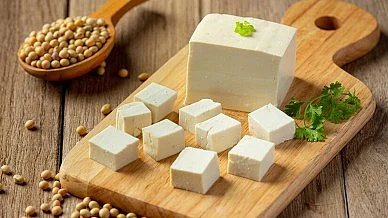Nation
In Punjab, maximum adulteration in paneer, ‘desi ghee’
The minister said out of 531 samples of ‘paneer‘, 196 samples were found to be sub-standard and 59 were unsafe for consumption

Punjab health minister Dr Balbir Singh on 6 August, Wednesday, said the maximum adulteration had been found in 'paneer' and 'desi ghee', citing the result of food product samples collected by the state government. He advised people to buy these consumable products from known sources or make them at their homes.
Sharing details of the samples collected, the minister said out of 531 samples of 'paneer', 196 samples were found to be sub-standard and 59 were unsafe for consumption.
"There is maximum adulteration in paneer and desi ghee," said Singh, while speaking to reporters in Chandigarh.
The sample results of the "unsafe paneer" showed that starches or some other chemicals were used to make them, he said.
He said the health authorities regularly take action when they find sub-standard paneer and destroy them.
Regarding desi ghee, the minister said the health authorities took 222 samples and of which 20 were of sub-standard quality and 28 were unsafe for consumption.
There are some people who are involved in making adulterated items and it is a crime, the minister said.
Singh advised people to purchase paneer and desi ghee from known sources like Verka (the brand of cooperative milk federation Milkfed) or make these products at home from milk.
The minister added that in the last five years, around 145 people were convicted and sentenced to six months' imprisonment for making unsafe products, especially paneer and desi ghee.
He further said adulteration was also found in masalas such as haldi (turmeric) and deghi mirch.
He said that his department has been regularly conducting public awareness programmes in this regard.
Published: undefined
Reaffirming the commitment of the AAP government under chief minister Bhagwant Mann to ensure safe and healthy food for people of the state, Singh exhorted the public to make maximum use of the 'Food Safety on Wheels' initiative, which has now been expanded to all the districts of the state.
'Food Safety on Wheels' are mobile food-testing vans that are equipped for screening for adulteration in major categories of food, including milk, paneer, water and other daily consumables.
"These vans are a crucial tool in our fight against food adulteration — I urge every individual to get their food tested," said the minister.
He added that since the Mann government came to power, 18,559 enforcement samples along with 12,178 surveillance samples have been taken by the department.
Additionally, over 13,000 samples have been screened for adulteration in the Food Safety on Wheels scheme so far, he said, adding that the major categories include paneer, ghee, milk, spices, fruits and vegetables and sweets.
Singh directed the Food and Drug Administration (FDA) officials also to utilise these food safety vans to their full potential and create awareness among the masses, especially among students, while asking them to act in a transparent manner and implement all the policies of the department in true letter and spirit.
He also emphasised that only "shudh ann" (pure food) would lead to "shudh mann and swasth tann" (pure mind and healthy body).
He reiterated that food adulteration will not be tolerated at any cost and strict action will be initiated against anyone found indulging in such activities.
Published: undefined
The health minister also highlighted that 3.17 lakh licences and registrations have been issued till date to food business operators (FBOs) and also urged all FBOs, including street food venders, to register themselves with the FDA.
He emphasised the need for balanced diets and informed dietary choices, urging the FDA too to intensify public education campaigns on nutrition and government health initiatives.
He appealed to the people to adopt the 'Eat Right, Stay Healthy' approach and contribute to building a healthier and nutritionally secure Punjab.
The minister highlighted that the FDA has put up around 500 awareness camps, in which over 55,000 people were trained regarding hygiene, eating right and food safety practices.
He also noted that 13 'Eat Right melas' have been organised in the state in the last three years to sensitise people about food safety.
Also, 150 certifications have been granted to Eat Right campuses, mandis, street food hubs, and the like.
Published: undefined
Follow us on: Facebook, Twitter, Google News, Instagram
Join our official telegram channel (@nationalherald) and stay updated with the latest headlines
Published: undefined